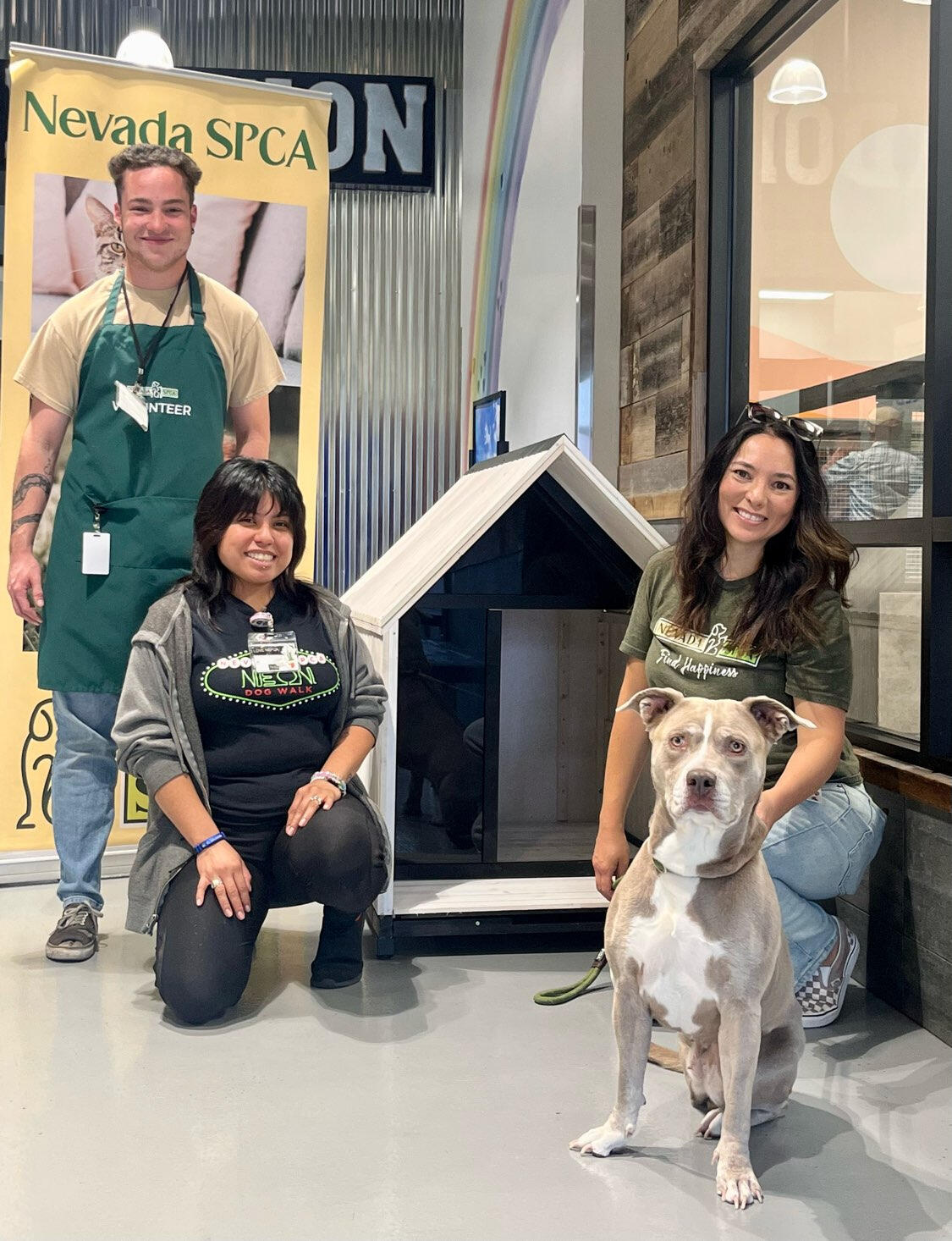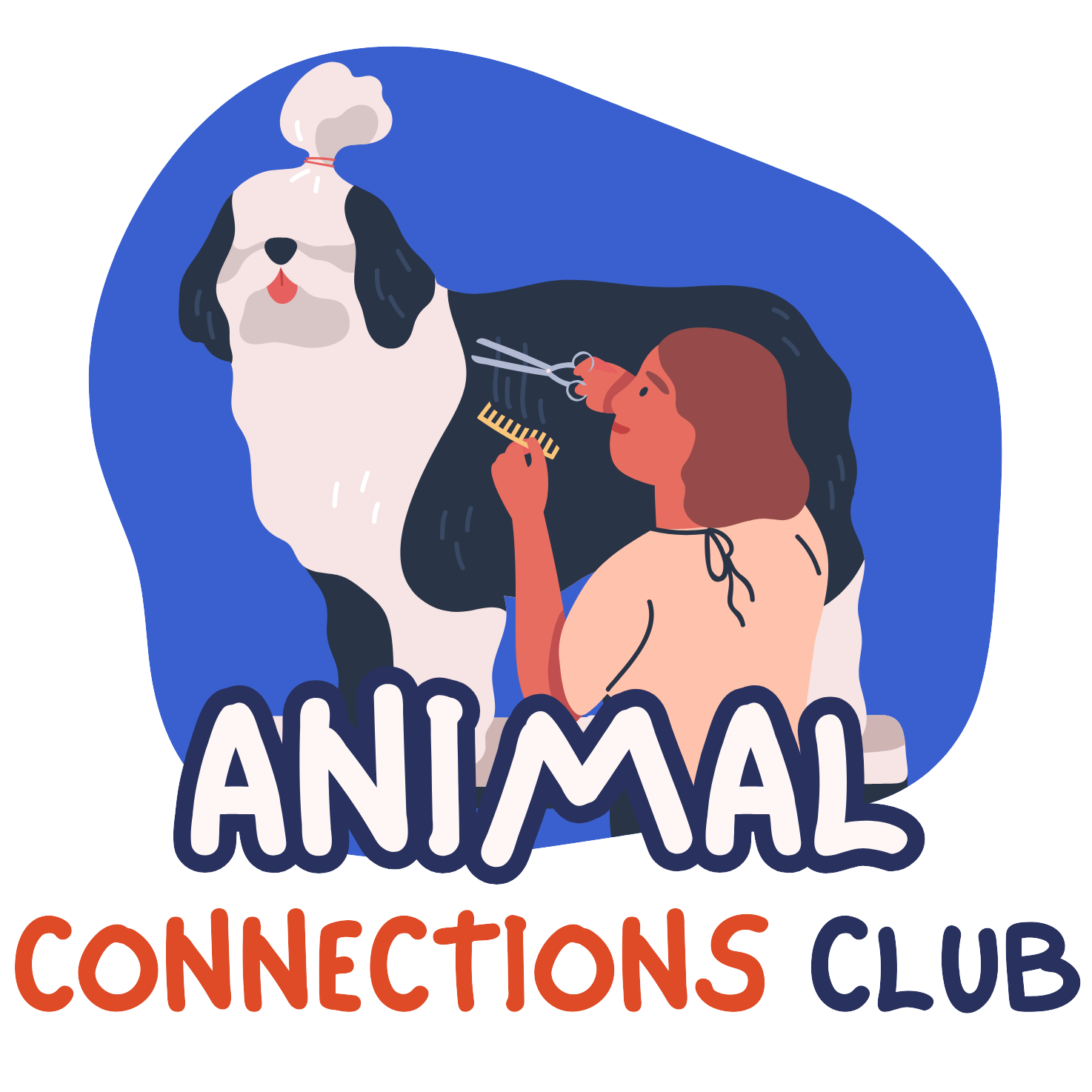
Do you love animals? Our mission is to provide a safe space for animal lovers to connect as well as resources, networking opportunities, and hands-on experiences to both non-students and College of Southern Nevada students of all majors. Whether you're exploring animal-related careers or hobbies, or just looking to make some friends, we’re here for you! we’re here for you! You can view who our current mentors, seminar speakers, workshop instructors, volunteer affiliates are here.Main Campus: Charleston/North Las Vegas
Meetings: Every last Friday of the month at 3:30 PM. Meeting link: meet.google.com/mjf-mtpj-fws
News
WINNER! PET COSTUME CONTEST
Congratulations to Lesli Itatani and Louie! Please send us a text at 702-336-3806 or email us to claim your $25 Petsmart gift card!

NEW CONTRIBUTOR: NEVADA SPCA
We have added the Nevada SPCA to our list of contributors!

OFFICIAL RECOGNITION!
Our club has been officially recognized by the College of Southern Nevada Student Government as of 3/7/2025!

Get In Touch
Whether you have a question for us, need assistance with something, have a suggestion, or anything else, we're always happy to hear from you.
Become a Member
If for some reason you cannot see the form below this text, click here.If you are a business or freelancing individual that would like to be included in our roster of Contributors, please apply here.
Position Statements & Definitions
Endorsements
Companion (pet) animals: Dogs, cats, horses, rabbits, ferrets, birds (excluding parrots/macaws), guinea pigs, degus, mice/rats, chinchillas, non-crocodilian reptiles, and fish as household pets. Where they may be kept legally and responsibly, domestic-bred livestock animals (cattle, sheep, pigs, rabbits, poultry, etc.) can also be pets.
Animal rescues & shelters: When people decide to bring a pet into their homes, they should first consider adoption from a shelter or rescue group.
Spay/neuter access: Supporting affordable and accessible sterilization services to reduce unplanned litters while respecting the role of ethical preservation breeding.
Veterinary access & telemedicine: Advocacy for expanded veterinary services, including remote care in underserved areas.
Animal-assisted therapy: Encouraging the responsible use of therapy animals in schools, hospitals, and mental health settings, with attention to animal welfare.
Humane animal-based research: Supporting regulated, humane use of animals in medical or behavioral research where alternatives are not viable and welfare is prioritized.
Responsible pet ownership education: Promoting outreach and education programs that teach humane care, enrichment, and commitment to animals for life.
Responsible breeding practices: Those who choose to purchase a pet should do so from a preservation breeder for the best shot at a healthy, temperamentally stable pet from a supportive background.
Oppositions
Dishonest animal rescue practices: importing of animals from other countries, dishonesty about an animal's background, donation misuse, emotional manipulation for financial gain.
Breed specific legislation: Housing discrimination or insurance denial based solely on breed or perceived breed.
Anti-breeder legislation:
Recent crossing of wild/domestic hybrids: Hybrids with a wild ancestor counterpart (ex. dogs and wolves) from less than 4 generations back.
Outdoor free-roaming cats:
Commercial breeding practices & sale of animals at pet stores: Mass breeding operations that breed for quantity and not quality to maximize profits, compromising on genetic health & overall well-being.
Exotic pet trade & trafficking: Opposing the illegal and unsustainable trade of wild-caught or trafficked exotic animals.
Backyard breeding: Casual or profit-motivated breeding. Casual meaning reasons for breeding not pertaining to preserving and/or improving a breed or type of animal.
Incorrect/inappropriate use of training tools: Use of shock, e-collar, prong, and other tools without professional guidance.
Definitions
Animal cruelty (general lawful definition, law varies based on region): A malicious or criminally negligent act that causes an animal suffering or death intentionally or unintentionally: 1) Neglecting needs for food, water, shelter, health care, socialization, 2) Abandonment, 3) Recklessly inflicting unnecessary physical injury, 4) Killing an animal under the custody or control of another person without either legal privilege or consent, 5) Leaving an animal unattended and confined in a motor vehicle where physical injury to or death of the animal is likely to result.
Events
Event Calendar
Below is our event calendar. If you are having trouble viewing it, click here!
Resources
pet owners in need
If you or a loved one are struggling to keep your pet due to personal circumstances, we have some resources below that may help!
New pet owner Info
Disclaimer: While we try our best to provide the most accurate resources for all animals, it's important that you remain cautious and research further than what we have provided, as pet ownership information is subjective and can vary depending on the type of animal (eg. reptiles).
General
Reptiles
Aquatic
Aquatic Arts - Online aquatic shop highly regarded by aquarium enthusiasts.
Small Mammals
Service Animal Resources
In Nevada and some other states, a license to own any dog (or other animal) is required by law (R 7.08.010). However, this is not a license meant to "prove" if an animal is a service animal or other working animal, it is a license for general ownership. Service animals are exempt from the fee for this license (R 7.08.070), this is because there is no formal certification process or paperwork recognized by the state or federal government for service animals (source: ADA.gov).You can find other info below.
Research Sources
Refseek.com - Academic Resource Search. More than a billion sources: encyclopedia, monographies, magazines.
World Cat - a search for the contents of 20 thousand worldwide libraries. Find out where lies the nearest rare book you need.
Springer Nature Link - access to more than 10 million scientific documents: books, articles, research protocols.
Bioline - a library of scientific bioscience journals published in developing countries.
Research Papers in Economics (RePEc) - volunteers from 102 countries have collected almost 4 million publications on economics and related science.
Science.gov - an American state search engine on 2200+ scientific sites. More than 200 million articles are indexed.
PDF Drive - the largest website for free download of books in PDF format. Claiming over 225 million names.
Bielefield Academic Search Engine - One of the most powerful researches on academic studies texts. More than 100 million scientific documents, 70% of them are free.
Library of Congress - Library of the US Congress.
National Library of Medicine - The world’s largest biomedical library that also supports and conducts research, development, and training.
Project Gutenberg - a library of over 60,000 free e-books.
Contributors
Below is the current list of contributors who we work with to provide opportunities and resources to our members. We truly appreciate their dedication and contributions to our community! If you are a business or individual that would like to be included in our roster of Contributors, please apply here.
Contributors are individuals, businesses, and organizations we collaborate with to offer opportunities and resources to our members. They operate independently with their own policies and procedures, and we do not assume responsibility for their actions.
Mentoring (M): A professional willing to mentor students in specific areas of learning (dog training, grooming, etc.) Mentors are expected to offer their knowledge for free or at low cost to students.
Seminar Speaking (SS): Professionals who provide 45 minute to 1+ hour long lectures to students at CSN regarding specific topics. *Can be paid for by the club or another organization, must be free to students.
Workshop Instruction (WI): Professionals who offer short classes to teach specific practical skills to students at CSN such as Pet CPR. *Can be paid for by the club or another organization but student discounts will be mandated if students are paying out of pocket.
Volunteer Groups (VG): A representative of non-profit organizations that is willing to lead students on volunteer trips. *Can be paid for by the club or another organization, must be free to students.
Resources
Affordable Therapy Info
1. Search for College/University Programs.
If you're a college/university student, you can start by searching for colleges in your region that have MA/MS/PhD/PsyD programs in counseling, clinical, or therapy. For those who attend the College of Southern Nevada (CSN), they have the Counseling & Psychological Services (CAPS) program. In other places, often times you'll be seeing a trainee practicing under a licensed clinician. Sometimes there is still a "fee" but it can be as low as $3/session (although it's free at CSN). If you're not a student or staff member, and the institution only serves members, ask if they can recommend affordable therapy options or resources for uninsured individuals.2. Search for Local Therapists Offering Sliding Scale Fees.
Use directories like Psychology Today or Google to search for therapists in your area. Look for the term “sliding scale,” which means fees are adjusted based on income. Some clinicians offer free appointments, though they don’t always advertise this due to financial constraints. If a therapist can’t help directly, ask for referrals to someone who can provide low-cost or free services.3. Community Mental Health Resources
Search for phrases like “community mental health” and “sliding scale” services in your area. Many community programs offer therapy at very low costs, sometimes as little as $1–$5 per session.4. Faith-Based Resources
If religious, spiritual or generally open to utilizing such organizations, consider reaching out to churches, synagogues, temples, or other faith-based organizations. Many offer counseling services, often provided by individuals with formal counseling training.5. Peer Support Groups
Search for “peer support groups” along with any specific mental health concerns. While these groups aren’t therapy, they can offer valuable support and connections to additional resources. If a group doesn’t feel like the right fit, try another.6. Insurance-Based Resources
If you have health insurance and are permitted to use it, contact the insurance provider to request a list of in-network mental health providers. The process may require persistence, but insurers can provide directories of covered therapists. Additionally, ask if providers accept sliding scale payments for any services not fully covered.Honorable Mention: For this section we interviewed Genel Gronkowski who is a CAPS Embedded Therapist for Cornell University's Veterinary students. We are very thankful for the expertise and time she spared to help us!
Preservation Breeders
The ACC will always encourage adoption from rescues/shelters but at the end of the day, we do understand that not everyone will adopt (for various reasons). We’re here to support our entire community, and if you’re going to buy, we want you to support someone who won't contribute to the homeless pet epidemic. If people who preferred to buy did it responsibly, we would have a lot less animals in rescues/shelters, and that’s a good thing for everyone.
What is a preservation breeder?
A particular type of breeder that focuses on breeding to improve and preserve an existing breed. These breeders are involved with small breed clubs and contribute to health and genetic research, as well as breed-specific rescue. Such breeders do breed-recommended health screening via veterinary specialists (ex. OFA hips) and compete with their animals in conformation and/or performance sports (agility, hunting, barrel racing, etc.) to measure and ensure the overall quality of their animals. Preservation breeders are committed to ensuring the safety and prosperity of their respective breed, and have an extensive process for selling their animals via personal buyer screening and contract signing.What are the best resources for people looking for ethical breeders?
1. Nonprofit Organizations and Clubs
For all domestic animals, breed-specific clubs such as the German Shepherd Dog Club of America usually have directories that can help you get started. Not all breeders in these directories are thoroughly screened though, so research individual breeders carefully.Below are some animal clubs/organizations that are available in the United States.
- Reputable Cat Organizations/Clubs: Cat Fancier's Association (CFA), The International Cat Association (TICA)
- Reputable Dog Organizations/Clubs: United Kennel Club (UKC), American Kennel Club (AKC) Silver State Kennel Club (SSKC, Nevada centered)
- Reputable Livestock Organizations/Clubs: Future Farmers of America (FFA), Nevada Agricultural Fair, Cornell Cooperative Extension Livestock Program Work Team2. Shows & Sporting Events
Conformation shows and sports events are great for meeting great breeders and getting recommendations. For example, the AKC Event Calendar where you can find Las Vegas hosted dog sports by the Silver State Kennel Club.3. Health Testing Databases
Some species do not require any testing but in cats and dogs for example, you can use OFA Advanced Search to find health-tested animals and identify breeders prioritizing health testing (these breeders also usually compete with their animals to improve on flaws).
If you are seeking a dog breeder specifically, we recommend these articles/resources:
• Ethos Veterinary Health: Checklist for Buying a Puppy from a Reputable Breeder
• Ethos Veterinary Health: Tests Reputable Breeders Perform with Veterinarians
• Cornell University College of Veterinary Medicine: Selecting a Purebred Puppy
• Better Breeder Institute
• DOGG!T
Breeder Flags
Below is a table of traits that are considered bad or good signs in a breeder.
| X | GREEN FLAG (GOOD) | RED FLAG (BAD) |
|---|---|---|
| Breeding Goal | To better the breed and quality of animals while preserving traits via a breed standard | To supply demand, make money, or other personal reason(s) (not applicable in livestock). |
| Breeding Decisions | (1) Selects carefully to prevent & correct physical/genetic defects or faults, (2) Completes any breed/animal required health testing and/or temperament testing | (1) Breeds specific colors, exaggerated sizes, or sizes/colors against or not described in the breed standard, (2) Breeds animals w/ none or incomplete health/temperament testing or titles |
| Activities | (1) Animals proven in conformation, sports, and/or working trials, (2) Registered w/ 1 or more reputable breed clubs/organizations | (1) Little/no involvement in conformation, sports, and/or working trials, (2) Is not registered w/ a breed club, or is registered w/ disreputable kennel clubs |
| Contract | (1) Health guarantees for genetic disorders & infectious disease, (2) Spay/neuter (if applicable to species), (3) Animal can go back to breeder (return policy) | (1) Iffy or no contract at all, (2) Suspicious or lacking health guarantee, (3) Breeding rights can be bought by anyone willing to pay extra, (4) Animals cannot go back to breeder (even if the purpose is reasonable) |
| Education | (1) Can refer to a mentor and educational sources, (2) Has years of experience w/ breed prior to breeding, (3) Has accurate & deep knowledge of breed's health/history | (1) Cannot refer to a mentor or proper education sources, (2) Little to no experience w/ breed prior to breeding, (3) Has little, vague, or incorrect knowledge of breed's health/history |
| Contact | (1) Receptive to questions, (2) Screens buyers before accepting deposits or payments to ensure buyer is responsible (2) Likes to follow up for updates and pictures and open to providing advice even after purchase | (2) Not receptive to questions, (3) Accepts deposits or payments without properly screening buyers, (4) Doesn't follow up for updates after purchase/not interested in giving advice |
| Sale of Baby Animals | (1) Never in a rush to sell/rehome, (2) Animals are sociable, healthy, clean, groomed, (3) Animals go home after appropriately weaned and socialized (8+ weeks for cats/dogs), (4) Will do temperament evaluations to ensure the best match for a buyer (not always applicable in livestock) | (1) In a rush to sell & has a high volume of animals available (dogs/cats only), (2) Animals are fearful/aggressive, sickly, filthy, and/or matted (3) Animals go home before they reach the appropriate age, (4) Does not do temperament evaluations and (for cats/dogs) lets buyer choose, (5) Charges more for specific traits such as color, size, etc. (Not applicable in some species but if advertised traits are against breed standard, that's universally unacceptable) |
| Papers | (1) Registration papers (w/ reputable breed club/organizatinon), (2) Authentic pedigree, (3) Any necessary health & vaccination records | (1) Registration papers used as a selling point or none at all, (2) No vaccination records/Does not provide necessary health records, (3) Fake (hung) pedigree or no pedigree at all |
| Social Life | (1) Has many connections w/ other breeders, judges, & hobbyists, (2) Willing to refer to other breeders as an alternative | (1) Has little to no connections to other breeders, judges, or hobbyists, (2) May refuse to refer to other breeders as an alternative |